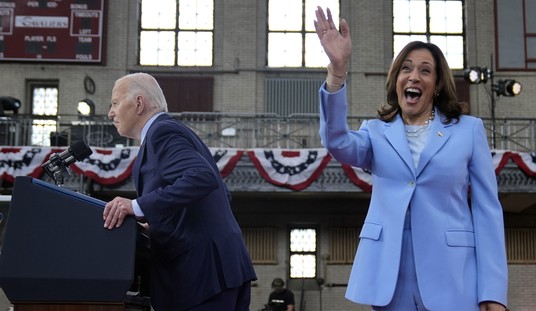In “John Edwards: Class-Warfare Charlatan,” at the Corner, Robert Rector writes:
Former senator John Edwards is back in the news. As a politician, Edwards’s main theme was “poverty.” He ran on this issue twice in Democratic presidential primaries and as candidate for vice president in 2004. Edwards famously declared there were “two Americas,” one rich and one poor; as a candidate, he spent most of his time exaggerating the chasm between the two.
In Edwards’s vision of America, nearly 40 million Americans live in “terrible” conditions, their daily life a “struggle with incredible poverty.” According to Edwards, America’s poor, who number “one in eight of us … do not have enough money for the food, shelter, and clothing they need.”
In his stump speeches, Edwards proclaimed, ”Tonight, a 10-year-old little girl will go to bed hungry, hoping and praying that tomorrow will not be as cold as today because she doesn’t have the coat to keep her warm.” Challenged by skeptics, Edwards’s staff reluctantly admitted the girl was “metaphorical.” But that never stopped Edwards from featuring her in speech after speech as the symbol of the “plague of poverty” ravaging an eighth of the nation.
Of course, Edwards often cooked the books when giving speeches:
You may remember John Kerry’s own memory of Edwards, as recounted, I believe, in Bob Shrum’s book.
Apparently Edwards was lobbying VP, and told Kerry a story about his son’s death, and gave a teary account of it, and told him that he’d learned so much from it and was ready to be VP, or that kind of thing.
And he concluded: And I have never. Told. Anyone. That story before.
Kerry got a chill when he heard this, but not for the reason you’d think. He’d got the chill because he remembered Edwards telling him this same story, with the same dead son and the same “And I have never — told — anyone” conclusion, to convince him on some other virtue of Edwards’, years earlier. And he got a sense of the man he was thinking about putting on the ticket.
Put him on the ticket anyway, of course.
Back to Rector’s original post, which noted:
It is true that, while Edwards was on the campaign trail, the U.S. Census Bureau regularly declared that nearly 40 million Americans were living “in poverty.” The question is, how many of the 40 million people defined as “poor” by the government were actually living in the dire conditions described by Edwards and the mainstream media? The answer: very few. As scholar James Q. Wilson has stated, “The poorest Americans today live a better life than all but the richest persons a hundred years ago.”
While Edwards campaigned for the presidency, the typical “poor” household, as defined by the government, had air conditioning and a car. For entertainment, the household had cable or satellite TV, two color televisions, a DVD player, and a VCR. If there were children in the home (especially boys), the family had a game system such as an X-box or Play Station.
These are verifiable government data, not metaphors. And there are more. The typical “poor” kitchen had a microwave, refrigerator, oven, and stove. Other household conveniences included a clothes washer, clothes dryer, ceiling fans, cordless phones, and a coffee maker.
The home of the average poor family was not overcrowded and was in good repair. In fact, the typical poor American had more living space than the average European. (Note: That’s average European, not poor European.) The family was able to obtain medical care when needed.
By its own report, the family was not hungry; actually, the majority of poor adults, like most Americans, were overweight. When asked, most poor families stated they had had sufficient funds during the past year to meet all essential needs. While poor families struggled to make ends meet, in most cases, they were struggling to pay for a car, air conditioning, and cable TV, while putting ample food on the table.
Edwards lectured the public endlessly about children in poverty, painting pictures of toddlers with empty stomachs living in shacks. But he never discussed the causes of child poverty. These are: very low levels of work among poor parents (even during economic boom times) and the collapse of marriage in low-income communities.
Which brings us to another piece of class-warfare charlatanism, Nicholas Kristof’s latest essay, appropriately titled, “Our Fantasy Nation?”
With Tea Party conservatives and many Republicans balking at raising the debt ceiling, let me offer them an example of a nation that lives up to their ideals.
It has among the lowest tax burdens of any major country: fewer than 2 percent of the people pay any taxes. Government is limited, so that burdensome regulations never kill jobs.
This society embraces traditional religious values and a conservative sensibility. Nobody minds school prayer, same-sex marriage isn’t imaginable, and criminals are never coddled.
The budget priority is a strong military, the nation’s most respected institution. When generals decide on a policy for, say, Afghanistan, politicians defer to them. Citizens are deeply patriotic, and nobody burns flags.
So what is this Republican Eden, this Utopia? Why, it’s Pakistan. [Wait, I thought you said nobody burns flags there — Ed]
Now obviously Sarah Palin and John Boehner don’t intend to turn Washington into Islamabad-on-the-Potomac. [So you ground all those rhetorical gears simply to do an Emily Litella impersonation? — Ed] And they are right that long-term budget issues do need to be addressed. But when many Republicans insist on “starving the beast” of government, cutting taxes, regulations and social services — slashing everything but the military — well, those are steps toward Pakistan.
The United States is, of course, in no danger of actually becoming Pakistan, [Yes, you just said that in the last paragraph — Ed] any more than we’re going to become Sweden at the other extreme. [Even though that’s the Times and the president’s fondest wish] But as America has become more unequal, as we cut off government lifelines to the neediest Americans, as half of states plan to cut spending on higher education this year, let’s be clear about our direction — and about the turnaround that a Republican budget victory would represent.
The long trajectory of history has been for governments to take on more responsibilities, and for citizens to pay more taxes. Now we’re at a turning point, with Republicans arguing that we need to reverse course.
Yes, it’s usually a good idea to reverse course before you go off a cliff, or if you’re still alive, even after you’re underwater:
Update: Walter Williams’ latest op-ed is an effective rebuttal to Kristof:
The president and his supporters call for tax increases as a means to cover the deficit, but higher tax revenues cannot eliminate the deficit. Controlling for inflation, federal tax revenue today is 23 times greater than it was in 1960, but congressional spending is 42 times greater. During the last half-century, except for five years, the nation has faced a federal budget deficit. It’s just simple math. If tax revenues soar, but congressional spending soars more, budget deficits cannot be avoided.
People ask what can be done to save our nation from decline. To ask that represents a misunderstanding of history and possibly a bit of arrogance. After all, how different are Americans from the Romans, Spaniards, French and the English? These were once mighty nations standing at the top of civilization. At the height of these nation’s prosperity, no one would have predicted that they’d become third-rate nations, especially England. If during Queen Victoria’s Jubilee in 1887 had a person suggested that England would become a third-rate nation and later challenged on the high seas by a sixth-rate nation (Argentina), he would have been declared insane.
One chief causal factor for the decline of these former great nations is what has been described as “bread and circuses,” where government spends money for the shallow and immediate wants of the population, and civic virtue all but disappears. For the past half-century, our nation has been doing precisely what brought down other great nations. We might have now reached the point of no return. If so, do we deserve it?
I’d say it depends upon how punitive you feel.









Join the conversation as a VIP Member